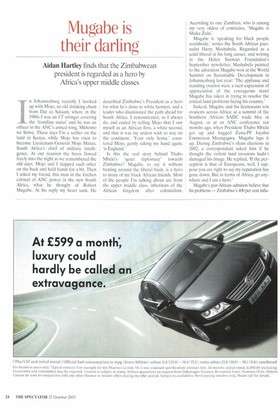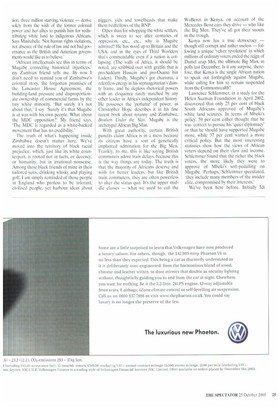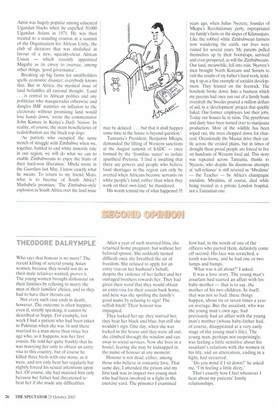Mugabe is their darling
Aidan Hartley finds that the Zimbabwean president is regarded as a hero by Africa's upper middle classes I, n Johannesburg recently I hooked up with Mojo, an old drinking churn from Dar es Salaam, where in the 1980s I was an FT stringer covering
the 'frontline states' and he was an officer in the ANC's armed wing, Mkhonto we Sizwe. These days I'm a settler on the land in Kenya, while Mojo has risen to become Lieutenant-General Mojo Matau, South Africa's chief of military intelligence. At our reunion the beers flowed freely into the night as we remembered the old days. Mojo and I slapped each other on the back and held hands for a bit. Then I asked my friend, this man in the kitchen cabinet of ANC power in the new South Africa, what he thought of Robert Mugabe. At his reply my heart sank. He described Zimbabwe's President as a hero for what he's done to white farmers, and a leader who illuminated the path ahead for South Africa. I remonstrated, as I always do, and ended by telling Mojo that I saw myself as an African first, a white second, and that it was my ardent wish to stay on the continent_ 'Your only home,' countered Mojo, gently taking my hand again, 'is England.'
Is this the real story behind Thabo Mbeki's 'quiet diplomacy' towards Zimbabwe? Mugabe, to say it without beating around the liberal bush, is a hero to many of my black African friends. Most of the people I'm talking about are from the upper middle class, inheritors of the African kingdom after colonialism. According to one Zambian, who is among my very oldest of comrades, 'Mugabe is Shaka Zulu.'
Mugabe is 'speaking for black people worldwide,' writes the South African journalist Harry Mashabela. Regarded as a solid liberal in his long career, and writing in the Helen Suzman Foundation's September newsletter, Mashabela pointed to the adoration Mugabe won at the World Summit on Sustainable Development in Johannesburg last year: 'The applause and standing ovation were a tacit expression of appreciation of the courageous stand Mugabe has taken in trying to resolve the critical land problems facing his country.'
Indeed, Mugabe and his lieutenants win ovations across Africa: at a summit of the Southern African SADC trade bloc in August, or at an ANC conference ten months ago, when President Thabo Mbcki got up and hugged Zanu-PF loyalist Emmerson Mnangagwa. Mugabe laps it up. During Zimbabwe's sham elections in 2002, a correspondent asked him if he thought the violent land invasions hadn't damaged his image. He replied, 'If the perception is that of Europeans, well, I suppose you arc right to say my reputation has gone down, But in terms of Africa, go anywhere and I am a hero.'
Mugabe's pan-African admirers believe that his problems — Zimbabwe's 400 per cent infla lion, three million starving, violence — derive solely from the wish of the former colonial power and her allies to punish him for redistributing white land to indigenous Africans. Says Mashabela: Not human rights violations, not absence of the rule of law and not bad governance as the British and American governments would like us to believe.'
'African intellectuals see this in terms of Mugabe correcting historical injustices,' my Zambian friend tells me. By now I don't need to remind you of Zimbabwe's colonial story, the forgotten promises of the Lancaster House Agreement, the building-land pressure and disproportionate ownership of commercial farms by the tiny white minority. But surely it's not about that,' I say. 'Surely it's that Mugabe is at war with his own people. What about the MDC opposition?' My friend says, 'The MDC is regarded as a white-backed movement that has no credibility.'
The truth of what's happening inside Zimbabwe doesn't matter here. We've moved into the territory of black racial prejudice, which, just like its white counterpart, is rooted not in facts, or decency, or humanity, but in irrational nonsense. Among these black friends of mine in their tailored suits, drinking whisky and playing golf. I am simply reminded of those people in England who profess to be tolerant, civilised people, yet harbour ideas about niggers, yids and towelheads that make them bedfellows of the BNP.
Other than for whopping the white settlers, which is sweet to sec after centuries of oppression, etc., etc., why is Mugabe admired? He has stood up to Britain and the USA, and in the eyes of Third Woriders that's commendable even if a nation is collapsing. (The walls of Africa, it should be noted, are scribbled over with graffiti that is pro-Saddam Hussein and pro-Osama bin Laden). Thirdly, Mugabe's got charisma, a relentless energy in his septuagenarian's dainty frame, and he deploys rhetorical powers with an eloquence rarely matched by any other leader in Africa's independent history. He possesses the 'perfume' of power, as Christopher Hope describes it in his fine recent book about tyranny and Zimbabwe, Brothers Under the Skin. Mugabe is the archetypal African Big Man.
With great authority, certain British pundits claim Africa is in a mess because its citizens have a sort of genetically implanted admiration for the Big Men. Frankly, to me, this is like saying British commuters adore train delays, because this is the way things are today. The truth is that the majority of Africans deserve and wish for better leaders, but like British train commuters, they are often powerless to alter the status quo. It's the upper middle classes — what we used to call the WaBenzi in Kenya, on account of the Mercedes Benz cars they drive — who like the Big Men. They've all got their snouts in the trough.
Kenya now has a true democracy —
though still corrupt and rather useless following a unique 'velvet revolution' in which millions of ordinary voters ended the reign of Daniel amp Moi, the ultimate Big Man, in polls last December. Is it any surprise, therefore, that Kenya is the single African nation to speak out forthrightly against Mugabe, while calling for him to remain suspended from the Commonwealth?
Lawrence Schlemmer, in a study for the Helen Suzman Foundation in April 2002, discovered that only 25 per cent of black South Africans approved of Mugabe's white land seizures. In terms of Mbeki's policy, 50 per cent either thought that he was correct to pursue his 'quiet diplomacy' or that he should have supported Mugabe more. while 37 per cent wanted a more critical policy. But the most interesting statistics show how the views of African voters depend on their class and income. Schlemmer found that the richer the black voters, the more likely they were to approve of Mbeld's soft-pedalling on Mugabe. 'Perhaps,' Schlemmer speculated, 'they include many members of the insider elite, compromised by their interests.'
We've been here before. Initially Idi Amin was hugely popular among educated Ugandan blacks when he expelled 50,000 Ugandan Asians in 1971. He was then treated to a standing ovation at a summit of the Organisation for African Unity. the club of dictators that was abolished in favour of a new, squeaky-clean African Union — which recently appointed Mugabe as its envoy to oversee, among other things, 'good governance'.
Breaking up big farms for smallholders spells economic disaster; everybody knows that. But in Africa, the mystical issue of land befuddles all rational thought. 'Land . is central to African politics and any politician who masquerades otherwise and dangles IMF statistics on inflation to the electorate without promising land would lose hands down,' wrote the commentator John Kamau in Kenya's Daily Nation. In reality, of course, the main beneficiaries of redistribution are the black top dogs.
'As patriots who occupied the same trench of struggle with Zimbabwe when we, together, battled to end white minority rule in our region, we will do what we can to enable Zimbabweans to enjoy the fruits of their hard-won liberation,' Mbeki wrote in the Guardian last May. I know exactly what he means. To return to my friend Mojo, what is to become of South Africa? Mashabela promises: The Zimbabwe-style explosion in South Africa over the land issue may be delayed . . but that it shall happen some time in the future is beyond question.'
Tanzania's President, Benjamin Mkapa, demanded the lifting of Western sanctions at the August summit of SADC — once formed by the 'frontline states' to isolate apartheid Pretoria. find it insulting that there are powers and people who believe food shortages in the region can only be averted when Africans become servants on white people's land, rather than when they work on their own land,' he thundered.
His words remind me of what happened 35 years ago, when Julius Nyerere, founder of Mkapa's Revolutionary party, expropriated my family's farm on the slopes of Kilimanjaro. Like the robbed white Zimbabwean farmers now wandering the earth, our lives were ruined for several years. My parents pulled themselves up by their bootstraps, survived and even prospered, as will the Zimbabweans. Our land, meanwhile, fell into ruin. Nyerere's men brought North Koreans and Soviets to visit the results of my father's hard work, holding it up as a fine example of socialist development. They feasted on the livestock. The borehole broke down. Into a business which my parents had once run out of a family bank overdraft the Swedes poured a million dollars of aid, in a 'development' project that quickly failed. Our former employees lost their jobs. Today our houses lie in ruins. The pyrethrum and dairy have been turned over to marijuana production. Most of the wildlife has been wiped out, the trees chopped down for charcoal. Occasionally the Maasai drive their cattle across the eroded plains, but in times of drought these proud people are forced to live on handouts of Western food aid. This story was repeated across Tanzania, thanks to Nyerere, who despite his disastrous attempts at 'self-reliance' is still revered as 'Mwalimu' — the Teacher — by Africa's champagne socialists. Mwalirnu, of course, died while being treated in a private London hospital, not a Tanzanian one.




































































































 Previous page
Previous page